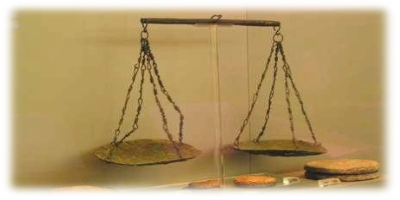


 |   |
| Home | Topics | Contact | | | Bookstore | Library | MT | AHLB |
 The Nature of GodBy Jeff A. BennerThe modern western perspective of God ignores the Hebraic concept of "balance," which is an integral part of the Ancient Hebrews perspective of who God is. The Masculine and Feminine nature of Elohim In our modern culture we tend to view God in masculine terms and imagery. While the word Elohim (Strong's #430), the plural form of the singular noun elo'ah (Strong's #433), is a masculine noun, it does not have to imply that the Elohim is plural or even masculine. To illustrate this, notice that the word Elohim is used for a female goddess in the following verse.
In the first chapter of Genesis, we receive our first glimpse of the nature of Elohim's gender.
Notice that in this verse it states that Elohim made humans in his image, but then it defines this image as male and female. From this we can conclude that the attributes of God are both masculine and feminine. We can then surmise that he placed his masculine attributes within the man and his feminine attributes within the woman and when a man and woman come together and become one (See Genesis 2:24), they together become the image of Elohim. Another reference to the masculine and feminine nature of God can be found in the following passages.
In the first verse is the phrase "LORD of hosts," which in Hebrew is Yahweh Tseva'ot. The word tseva'ot is the plural of the word tsava (Strong's #6635), a feminine noun meaning "force." When two nouns are placed together, they are in the construct state, therefore this phrase would be translated as "Yahweh of the forces." In the second verse is the phrase "LORD God," which in Hebrew is Yahweh Elohim." The word Elohim means "one[s] of power and authority," or simply "powers." Again, this phrase consists of two nouns put together to form a construct and should be translated as "Yahweh of the powers." I should note here that the phrase "LORD God" not only ignores the Hebrew word "Yahweh," which does not mean "lord," but also the construct nature of the phrase. In Hebrew grammar two nouns put together always form a construct, usually identified in the English language with the word "of," and to my knowledge, nowhere else in the Bible are two nouns not translated in the construct state. Notice that the two phrases Yahweh Tseva'ot and Yahweh Elohim are synonyms, one using a feminine plural word meaning "forces," the other a masculine plural word meaning "powers." Also note that Yahweh is not the tseva'ot but a part of it, Yahweh is a part of the "forces," hence the usual translation of "LORD of hosts." In the same manner, Yahweh is not the Elohim, but a part of it, a part of the powers. But notice that while the translators will consistently use "LORD of hosts" for Yahweh Tseva'ot, they never use "LORD of powers" for the phrase Yahweh Elohim. The idea of a single male deity is unique to our modern era. In all the ancient cultures, the Elohim was a male and female. In Egypt it was Osiris (masculine) and Isis (feminine). In Canaan it was El and Elat (also known as Asherah). To the Greeks it was Zeus and Hera. To the Romans it was Jupiter and Juno. To the Germans it was Odin and Frigg. I am not making the claim that the Elohim of the bible are a god and goddess, just that the attributes of Elohim are both masculine and feminine. The Positive and Negative nature of Elohim When I speak of the positive and negative nature of Elohim, I am not speaking about a "moral" positive and negative, but the "forces" of positive and negative, much like the two poles of a magnet or the forces of the protons (positive) and electrons (negative) of an atom. God is a perfect balance of positive and negative: Good and Bad, Light and Dark, Large and Small, Make and Break, Loud and Quiet, Far and Near, One and Many, Male and Female, etc. This concept of "balance" is virtually unknown in our western philosophy, but is a very important one in the ancient philosophy of the Israelites and other ancient peoples. From this ancient perspective, "balance" is "order" and anything out of balance is chaos. In the following two verses we can see this balance of positive and negative within the actions of Elohim.
In the first verse we see Elohim creating (positive) the world, but in the second verse we see him destroying (negative) it.
In these two verses we see Elohim being associated with light (positive) and darkness (negative). It is interesting to note that Jews and Christians always associate Elohim with light and Satan with darkness. However, almost every time Elohim appears to the Israelites, he is in the darkness. In Genesis 1:4 we read that "Elohim separated the light from the darkness." The word for light is feminine while the word for darkness is masculine. Not only is this verse about the balance of light and darkness, but it is also about the balance of the masculine and the feminine. In the next two verses we see two contrasting attributes of Yahweh, mercy (positive) and a consuming fire (negative).
In Genesis 1:26 we find that the image of Elohim is male (positive) and female (negative). In Genesis 3:5 and 3:22 we see that Elohim is good (positive) and bad (negative). In Joshua 23:15 we read that Yahweh does good things (positive) and bad things (negative). In Deuteronomy 30:1 Yahweh provides blessings (positive) and curses (negative). In Isaiah 45:7 we are told that God makes peace (positive) and evil (negative). Below is one of the most vivid passages in the entire Bible that demonstrates this positive and negative aspect of ancient philosophy.
|